Diane Stringam Tolley's Blog: On the Border, page 135
April 2, 2018
Con-veniences

Log on: is something you should do to make the homestead warm.Log off: Watch out! The tree is chopped and falling. (Could cause harm.)Mega Hertz: When you’re not careful as you fetch the wood.Lap top: Cat’s ‘purr-ferred’ sleeping place where all is well and goodHard drive: Maneuv’ring vehicles through mud or rocky ground.Windows: Those are what you shut when snow is all around.Byte: Is what mosquitoes do, those pesky little fiends.Modem: Work at haying time when fields are being gleaned.Keyboard: Something near the door where all the keys are hung.Mouse: Those critters in the barn you’re forced to live among.Then ‘Random Access Memory’ or RAM, ‘cause sure enough,It’s when you can't remember any of this awful stuff.
So there you have it and you know the ‘country’ explanation,Now can you understand us farmers’ up-to-date frustration?
 Mondays do get knocked a lot,With poetry, we three besought,To try to make the week begin,With gentle thoughts--perhaps a grin?So Jenny and Delores, we,Now post our poems for you to see.And when you’ve read what we have brought,Did we help? Or did we not . . .
Mondays do get knocked a lot,With poetry, we three besought,To try to make the week begin,With gentle thoughts--perhaps a grin?So Jenny and Delores, we,Now post our poems for you to see.And when you’ve read what we have brought,Did we help? Or did we not . . .
Next week, just watch us as we dance,When we three tackle ignorance!
Published on April 02, 2018 09:31
April 1, 2018
Happy Birthday, Daddy!
April 1, 2018.
Daddy's 93rd birthday.
Today's story won't be told by me.
Instead, I'll let the man himself spin the yarn.
It'll be good!
Daddy's 93rd birthday.
Today's story won't be told by me.
Instead, I'll let the man himself spin the yarn.
It'll be good!
Published on April 01, 2018 09:10
March 31, 2018
Breakfast of Champion
 Maybe there's a reason those teeth are missing...
Maybe there's a reason those teeth are missing...Saturday.Is there a better day in the week?For 8-year-old Diane, Saturday really stood out.It was the one day of the week she got to start things on her own.I should probably point out here that everyone else’s schedule didn’t change one bit. Mom still rose at the crack of dawn to make breakfast for all and sundry. Look after her two babies and numerous other children. Clean. Hoe the garden. Take care of the pets that we children insisted on getting (and tended diligently for the whole of two hours). And generally make sure that the home wheels were greased and running smoothly.Dad had also risen at the same time. Heading out into the pure morning air to coordinate with the hired men and make assignments, check the animals in the ranch proper, feed said animals, milk any and all available cows and generally greet the rising sun before reporting back to the ranchhouse for a well-earned breakfast.The older kids had gotten up more or less with our parents. Eaten and hurried off to their assigned tasks.Then Diane awakened. Stumbled out of her bedroom to an empty, tidy kitchen (yes, Mom was a miracle worker) and began to scrounge up her own breakfast.Okay, yes, there was probably a plate of something foil-wrapped and kept warm on the back of the stove, but what fun was there in that?Especially when Mom wasn’t there to supervise Diane’s sugar intake.Because that was what ‘scrounging her own breakfast’ meant.Sugar.Now on a normal day, Diane was allowed just two teaspoons of chocolate in her glass of frothy, fresh milk.When Mom was absent, the sky was the limit.And the colour of the milk went from white to dark in a few delicious, heaping-teaspoonsful seconds.But it didn’t end there.Nope.There was also the bowl of branflakes. Poured generously into Diane’s favourite bunny bowl. Packed down and covered with just the right amount of creamy milk. Packed down again to make sure every flack received its milky due.Then unsupervisedly (?) covered again with a rich layer of granulated, white, heaven—aka: sugar.Then the eating—or rather—gorging began.You have to know that Mom wasn’t very often absent from the kitchen—even on Saturdays.That’s probably the main reason Diane is still alive today . . .
Published on March 31, 2018 08:02
March 30, 2018
Carved in Stone
 When e’re we fly, my man and me,To countries near or o’er the sea,We find the old cem-e-ter-ies,And take a stroll through history.
When e’re we fly, my man and me,To countries near or o’er the sea,We find the old cem-e-ter-ies,And take a stroll through history.For neatly 'scribed in work so fineOr faded now in blurry linesWe read of lives, meek or sublime,Upon the headstones, lost in time.
The saddest are the children gone,Those lives stopped short from living on,Who made no choices, right or wrong,Called from embraces firm and strong.
With careful steps we move along,And find some words inscribed with song,A life well-lived and days so long,With courage and with faith so strong.
This one, it seems, had loved to fish,That one’s flirtatious, quite the dish,A third thought horses so delish,The best friends anyone could wish.
Here’s a discerning, bookish man,The next one’s hard to understand,I see the words ‘The Best’ and ‘Land’,Oh, there’s the Grandpa of the clan.
A hunter sure, was this man’s claim,A vixen’s carved beside his name,Each one unique, and none the same,Some unknown and some with fame.
Each tells of life or life-to-be,And written there for all to see.So when I’m gone, an absentee,What will someone say ‘bout me?
Published on March 30, 2018 06:48
March 29, 2018
My Buddy
Okay, yes I talk to him.In my defense, I talk to everyone . . .A year ago, Son #3 and Husby went together to buy me a gift.I should explain here that I am very difficult to buy gifts for. Being of a very practical mind set, any gift presented to me needs to be the same. Practical. Oh, I will admit that the occasional bouquet of flowers will definitely not be thrown out, but tenderly interred in a vase until such time as they have gone the way of all the earth.At which time they willbe thrown out.Ahem . . .Husby, on the other hand, loves to give gifts. And practicality is not a requirement.In fact, when choosing something for me, he goes out of his way to find ‘something else’ that isn’t for home or yard.But he has learned in our over forty years of marriage, that when I say I want a new frying pan for Christmas, a new frying pan is what will make me happy.Back to the gift purchased by Husby and Son #3.A few years ago, someone—may I call them genius?—invented a vacuum that doesn’t need anyone to operate it. Independent and effective, it bounces back and forth around the room until every single surface has been swept clean.It’s remarkably effective.At least that is what I saw on the TV spot.And decided I wanted. On the spot.To clean up the messy spots in my house.Okay, now I’m seeing spots.Moving on . . .I pointed. “That is what I want for Christmas!”Husby countered with his patented, “But I want to get something for you!”To which I replied, “That is for me!”Nothing more was said. Until Christmas morning when the box, partially-wrapped as per Son #3’s penchant, was set on the floor in front of me.Frenzied removal of the woefully inadequate wrapping.Exclamations of surprise and delight.The reading of instructions.And the immediate putting to work of my new right-hand man. ‘Buddy’, as he was dubbed, from that moment, did the one job in my house I have always loathed.Vacuuming. My affection for him was instant and long-lasting.Daily, he bustles around the house, doing a remarkably effective job of removing visible dirt and icky stuff.He has even been known to find lost puzzle pieces.There are a couple of drawbacks.And we have finally come to the point of my story . . .Buddy was vacuuming.I was in my office. Writing.Buddy came in and proceeded to bump into things.I got up and left for a moment.Then heard the ‘alert’ sound from my beloved helper. Followed by an immediate power down.I hurried back to the room.Only to discover that Buddy had eaten the cord of a charger. Causing instant indigestion.Chastising him vocally, I carried him out to the kitchen to perform the necessary cord-ectomy. Picture it: Upending the unit. Removal of the rollers that prove so effective in home maintenance. Removal of said cord. Emptying of all tanks and reservoirs and unexpected storage places.Reinstalling of rollers.Uprighting.And sending back to work.The whole time, keeping up a steady stream of: “You silly boy! Don’t you know that cords only make you sick? Where did you find this? And a button! Oh, good, I was looking for that one.” And once he was back on the floor, a final word: “Now stay out of trouble!”My granddaughter was watching the whole operation. As Buddy buzzed off, she looked at me. “Gramma. You were talking to the vacuum.”I nodded as I washed my hands.“Gramma, that’s weird.”I thought of the times I had fished Buddy out of yet another scrape. Most notably getting stuck in the bathroom. (We may possibly have the cleanest bathroom floor in the world.)I talked to him then as well.Granddaughter went on, “Gramma, you shouldn’t talk to things.”Well then someone probably shouldn’t have put eyes on him!Just FYI.
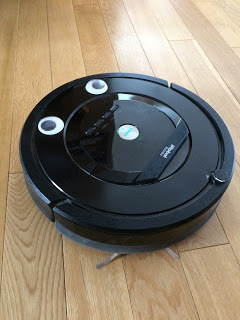
Published on March 29, 2018 12:01
March 28, 2018
Modern Hunt-ers
 Tasty!Husby and his business partner love history.The one a historian and the other an archeologist, it’s a good thing.And a good combination.Years ago, while on a business/holiday, the four of us: Husby, me, Business Partner (hereinafter known unimaginatively as BP) and his sweet wife stopped at a well-known mud wallow.Now before you think there was any sort of mud-wrestling performed there, let me further inform you that it was a place where, anciently, Native Americans drove buffalo and, when the animals became mired in the sticky ickiness (technical term) dispatched them at their leisure. Rinsed them off. And ate them.True story.Today this place is a treasure trove of boney remainders as well as ancient tools and weapons.While we two women sat visiting in the campsite, the men decided to go off on a might-find-an-arrowhead explore.Which they did.And which they did.Grinning widely the two returned a short time later with the (to quote them) Find-of-the-Century.An arrowhead.A real arrowhead.Which they proudly held out for their wives to oooh and aaah.I have to tell you that it really didn’t match the description of any artifact I had seen or heard of.For one thing, it was made of rubber.And featured a suction cup at one end.Yes, it was an arrowhead.But one generally seen fitted to the end of a short stick notched to a tiny bow in the hands of the nearest modern four-year-old.Technically an arrowhead, though.Moving forward too many years to count . . .Supper hour was fast approaching.Our two intrepid hunters, both a little older and greyer than during their last hunting trip, took it upon themselves to ‘hunter-gather’ us women some grub.Bravely, they set forth.Armed only with their mode of conveyance.And their wallets.Grinning widely, they returned a short time later having--in their words--bagged a trophy.Ice cream.We’re so proud.
Tasty!Husby and his business partner love history.The one a historian and the other an archeologist, it’s a good thing.And a good combination.Years ago, while on a business/holiday, the four of us: Husby, me, Business Partner (hereinafter known unimaginatively as BP) and his sweet wife stopped at a well-known mud wallow.Now before you think there was any sort of mud-wrestling performed there, let me further inform you that it was a place where, anciently, Native Americans drove buffalo and, when the animals became mired in the sticky ickiness (technical term) dispatched them at their leisure. Rinsed them off. And ate them.True story.Today this place is a treasure trove of boney remainders as well as ancient tools and weapons.While we two women sat visiting in the campsite, the men decided to go off on a might-find-an-arrowhead explore.Which they did.And which they did.Grinning widely the two returned a short time later with the (to quote them) Find-of-the-Century.An arrowhead.A real arrowhead.Which they proudly held out for their wives to oooh and aaah.I have to tell you that it really didn’t match the description of any artifact I had seen or heard of.For one thing, it was made of rubber.And featured a suction cup at one end.Yes, it was an arrowhead.But one generally seen fitted to the end of a short stick notched to a tiny bow in the hands of the nearest modern four-year-old.Technically an arrowhead, though.Moving forward too many years to count . . .Supper hour was fast approaching.Our two intrepid hunters, both a little older and greyer than during their last hunting trip, took it upon themselves to ‘hunter-gather’ us women some grub.Bravely, they set forth.Armed only with their mode of conveyance.And their wallets.Grinning widely, they returned a short time later having--in their words--bagged a trophy.Ice cream.We’re so proud.
Published on March 28, 2018 07:02
March 27, 2018
PJs on Vacation
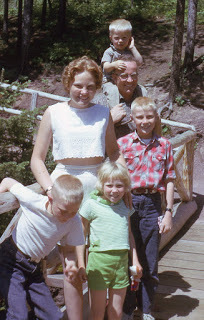 That's me in the green. Dressed appropriately.Mom was a stickler for clothing customs and traditions.“Wear a jacket.” “Put on your shoes.” “Where’s your hat?” “You need gloves/boots/armour in the barnyard.” “Get your helmet!” “I don’t care what the other girls are wearing, you are not going swimming naked!”And others.Clothes were almost a uniform to her. You wore what was appropriate. When it was appropriate.Oh, we were still able to dress in what was going. Bell-bottoms. Not-quite-mini skirts. Go-go boots. (Okay those were my sister’s that I may or may not have sneaked out of her room.)But one had to wear what. And when.Now to my story . . . Husby and I are in the sweet little town of Cardston, Alberta.Husby wants to build a museum here and/or spruce up the main street.It entails lots of glimpses into history.Yesterday, he and his partner were touring the period hotel that graces main street. The Cahoon.And I had my own glimpse into history . . .Mom and dad and we kids were here in Cardston for some reason.I don’t remember why. Relatives? Church? Business?I was five. I had gotten into the car because whenever the family was going somewhere, it was an ADVENTURE.Soooo . . . Cardston.While we were here, as sometimes happens in the Great Canadian Prairies in close proximity to the equally-great-but-for-different-reasons Rocky Mountains in the winter, a great storm blew in.And engulfed us.And the town.And probably quite a large part of the surrounding countryside.Dad decided it was far safer to seek refuge right here where we were.We drove to the only hotel. The Cahoon. A great stone structure that loomed over main street. Requested and were granted rooms.And proceeded to ready ourselves for bed.I remember three things. That make sense to me now, knowing that the stop-over was completely unplanned. But that didn’t when I was five.1. A great iron bedstead that creaked and was really springy and perfect for jumping. Except that Argus of the Hundred Eyes (ie. Mom) was watching me.2. I didn’t have to brush my teeth because I didn’t have a toothbrush. And, most importantly.3. Mom stripped me out of my clothes and tucked me into the great, springy bed in only my undershirt and panties.Wait. What? No Pajamas?I narrowed my eyes suspiciously. Not even a nightie?This had never—ever—happened before. I was expected to actually sleep? Almost naked?I know I probably went out like the proverbial candle, with or without my pajamas.And woke the next morning as refreshed and energetic as if I had been in my own bed, on my own ranch, in my own PJ’s.To yet another new and exciting thing:4. Breakfast in the hotel restaurant!It’s funny how all of this came back as we stood there, staring up at the great, old hotel.P.S. You have to know that pajamas still make up a large part of preparing myself for bed.
That's me in the green. Dressed appropriately.Mom was a stickler for clothing customs and traditions.“Wear a jacket.” “Put on your shoes.” “Where’s your hat?” “You need gloves/boots/armour in the barnyard.” “Get your helmet!” “I don’t care what the other girls are wearing, you are not going swimming naked!”And others.Clothes were almost a uniform to her. You wore what was appropriate. When it was appropriate.Oh, we were still able to dress in what was going. Bell-bottoms. Not-quite-mini skirts. Go-go boots. (Okay those were my sister’s that I may or may not have sneaked out of her room.)But one had to wear what. And when.Now to my story . . . Husby and I are in the sweet little town of Cardston, Alberta.Husby wants to build a museum here and/or spruce up the main street.It entails lots of glimpses into history.Yesterday, he and his partner were touring the period hotel that graces main street. The Cahoon.And I had my own glimpse into history . . .Mom and dad and we kids were here in Cardston for some reason.I don’t remember why. Relatives? Church? Business?I was five. I had gotten into the car because whenever the family was going somewhere, it was an ADVENTURE.Soooo . . . Cardston.While we were here, as sometimes happens in the Great Canadian Prairies in close proximity to the equally-great-but-for-different-reasons Rocky Mountains in the winter, a great storm blew in.And engulfed us.And the town.And probably quite a large part of the surrounding countryside.Dad decided it was far safer to seek refuge right here where we were.We drove to the only hotel. The Cahoon. A great stone structure that loomed over main street. Requested and were granted rooms.And proceeded to ready ourselves for bed.I remember three things. That make sense to me now, knowing that the stop-over was completely unplanned. But that didn’t when I was five.1. A great iron bedstead that creaked and was really springy and perfect for jumping. Except that Argus of the Hundred Eyes (ie. Mom) was watching me.2. I didn’t have to brush my teeth because I didn’t have a toothbrush. And, most importantly.3. Mom stripped me out of my clothes and tucked me into the great, springy bed in only my undershirt and panties.Wait. What? No Pajamas?I narrowed my eyes suspiciously. Not even a nightie?This had never—ever—happened before. I was expected to actually sleep? Almost naked?I know I probably went out like the proverbial candle, with or without my pajamas.And woke the next morning as refreshed and energetic as if I had been in my own bed, on my own ranch, in my own PJ’s.To yet another new and exciting thing:4. Breakfast in the hotel restaurant!It’s funny how all of this came back as we stood there, staring up at the great, old hotel.P.S. You have to know that pajamas still make up a large part of preparing myself for bed. Just ask Husby.
Published on March 27, 2018 07:39
March 26, 2018
Half Wit
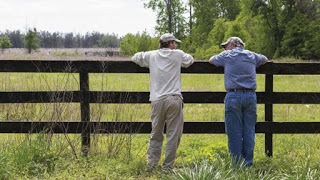 The Government boys said John was stingy when he paid his crew,And so they sent a man to see—give John an interview.The man found John just sitting, milking, in the stanchions there,And pulling out his pad and pen, he took the offered chair.
The Government boys said John was stingy when he paid his crew,And so they sent a man to see—give John an interview.The man found John just sitting, milking, in the stanchions there,And pulling out his pad and pen, he took the offered chair.“It’s come to our attention, John,” the agent said to him,“That you’re not giving proper wages when you pay your men.”John just shrugged and kept on milking—spat a wad of ‘chew’,“Wal, I’m here Mister,” Johnny said. “And glad to talk it through.”
“Just list your men,” the agent said. “And what you pay each one.And I’ll decide what we should do the moment you are done.”“Okay, Mister,” Johnny said, his voice real calm and slow,“I’ll tell you everything you want and then I hope you'll go.”
The agent made a face, and clicked his pen. “Alright. Let’s start.”Then Johnny smiled. “Well, first we’ve got my hired man named Bart.”“Bart’s been with me for three years, he seems to be content.I pay him six C’s every week with free board and free rent.”
"The cook has been here 18 months, each week she gets 5 C’s,And just like Bart, free room and board, she certainly seems pleased.”“And any more?” the agent said. “You have to name each one.”“There is another man,” John said. “Who’s really not much fun.”
The agent clicked his pen. “I need to hear about him. Tell!” John shrugged again, said, “You’re the boss, but he is a dumbbell.He’s really just a half-wit, Sir. He works a longer day.When all the others stop and rest, he’s out there ‘makin’ hay’!"
"For eighteen hours each day, he toils, does all but 10 percent.He makes about ten bucks a week, pays his own food and rent.To keep him happy, Sir, I buy him bourbon once a week,Just why he stays around? It smacks of something called ‘mystique’."
The agent perked up at John’s words. Here’s what he sought to find!A criminal departure from what’s normal, in his mind.He made a note upon his pad and closed it with a snap.Beneath his breath he muttered, “Man I’d like to meet this sap!”
“Yes! That’s my guy!” he said aloud. “Just call the half-wit, please?”“Wal, that’s an easy one,” said John. “That guy you want is me!”
 Mondays do get knocked a lot,
Mondays do get knocked a lot,With poetry, we three besought,To try to make the week begin,With gentle thoughts--perhaps a grin?So Jenny and Delores, we,Now post our poems for you to see.
And when you’ve read what we have brought,Did we help? Or did we not . . .
Next week, amid the toil and strife,We'll talk about this modern life!
Published on March 26, 2018 07:00
March 23, 2018
The Toy Box
 Last night was opening night.
Last night was opening night.It's the end of March and for those of you who know me, that means our annual Children's Theatre musical production.
This year?
The Toy Box. Music and lyrics by Yours Truly.
Directed by my good friend and first time director, Jodi Cuevas. (Who did an awesome job, I have to tell you!)
And acted by the most amazing cast of children with a sprinkling of equally amazing adults. (Because who else is going to keep those littles in line on stage?!)
The story revolves around four different groups of toys in The Toy Box, a toy store. Three of the groups, the soldiers, the Barbies and the clowns are pretty much centered on themselves. The fourth group, the Stuffies just want to hug everyone.
And giggle.
When one of the Stuffies is badly mauled by an opossum that has gotten into the store, the rest of the toys realize they have to work together as a family to convince the creature to move out.
How they do it is both simple . . . and ingenious.
Such a fun, fun production.
And so grateful I get to do this!
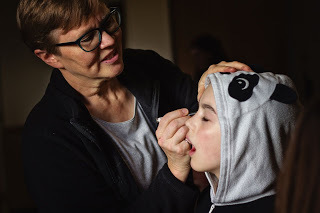 Pictures by Kristi Pfeiffer PhotographyMe. Eyelining. This is the before.
Pictures by Kristi Pfeiffer PhotographyMe. Eyelining. This is the before.The after is me on a stool in a corner. Sans eyeliner pencil and actor.
Because the others realized I'm just a danger with any sort of makeup...
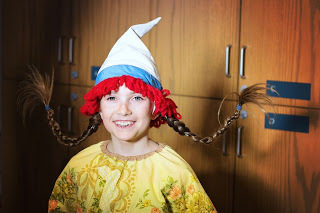 One of the uber-cute clowns.
One of the uber-cute clowns. A Stuffie. Not quite in costume...
A Stuffie. Not quite in costume...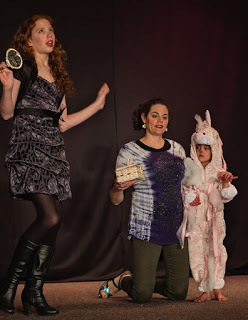 Barbies. Some doing what they do.
Barbies. Some doing what they do.Others getting ready to help little shredded stuffies.Please, powers-that-be, let this go on forever!
Published on March 23, 2018 11:14
March 22, 2018
Just a Glimpse
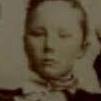 Grandma Stringam. Then.
Grandma Stringam. Then.During her growing up years, Grandma Stringam was ‘happy and active and busy’. She was taught to darn, knit and embroider and also how to do all the household tasks. Most amusement was found out-of-doors, playing such games as Fox and Geese, Run Sheep Run, Hide and Seek, baseball and horseback riding. Once a week, they went to the school for what they called ‘Physical Culture’ when they exercised and worked with ‘Indian Clubs’.She attended a one-room schoolhouse which was heated with a large, wood-burning pot-bellied stove in the center of the room.This building was also used for church on Sunday and for ‘dances and other forms of amusement’.For the first years, she did all her writing on slates and all she needed was said slate, a slate pencil and damp sponge or rag to erase (usually attached to the frame of the slate with a string). The families all purchased their own school supplies: slates in the first two grades and then notebooks and textbooks thereafter. They had no libraries.The first teacher Grandma remembered (around 1890 or 91) was Ephrium (Ephie) Blackburn and what she recalled most was getting ready for the twice-a-year concerts at Christmas and just before the end of term. His wife played the organ and he taught the schoolchildren to sing.Their school term was shorter than the present day. About six months, from the first of October to the last of March or early April.Every Monday, after she turned twelve, she had to stay home to help her mother with the washing.Grandma asked her mother why her older sister, Jane, couldn’t take over alternate Mondays so Grandma wouldn’t have to miss so much school. Her mother told her Jane didn’t get things clean enough in the first round so when they came to her mother for the second round, she had to work too hard to get them clean.Grandma didn’t complain much after that, knowing that she was making things a little easier for her mother.She attended school until she finished the eighth grade, which was quite an achievement in those times and in that particular community.After she finished, she worked for one school year in her Uncle Charlie’s store so his daughter, who was a year younger, could take her grade eight.
I am fascinated by these glimpses into another era. And more grateful than I can say that I have access to these writings…
Published on March 22, 2018 07:00
On the Border
Stories from the Stringam Family ranches from the 1800's through to today.
Stories from the Stringam Family ranches from the 1800's through to today.
...more
- Diane Stringam Tolley's profile
- 44 followers



